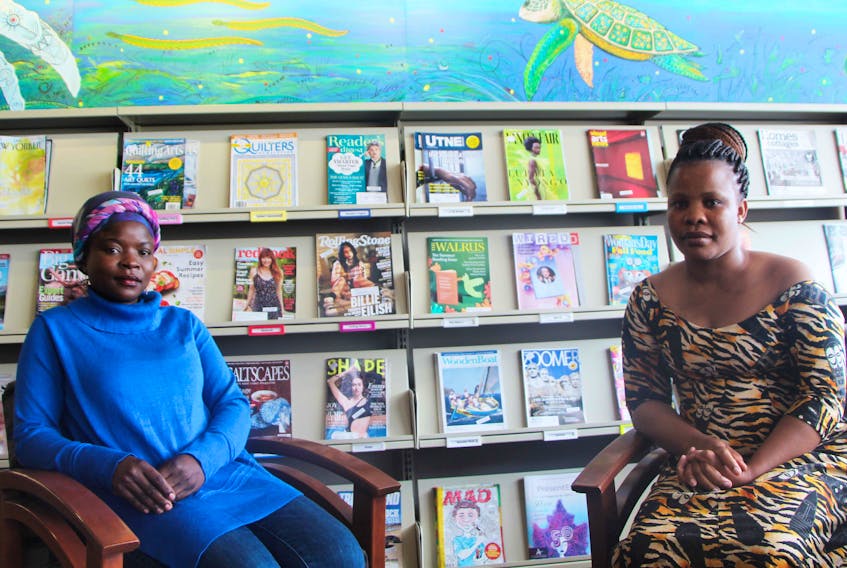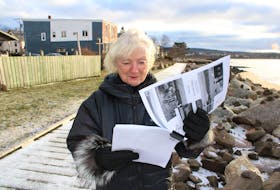ANTIGONISH, N.S. — A couple of refugee families from the Democratic Republic of Congo are now calling Antigonish home; thanks to the efforts of St. Ninian Parish Canadians Accepting Refugees Everywhere (C.A.R.E.).
Gracia Mwamba and her three daughters, ages 13, 9 and 7, have been in the community since mid-July. Faida Fiki and her two children – a 13-year-old boy and girl age 8 – arrived less than a month ago (Sept. 12).
Both families had been living as refugees in the South African capital of Pretoria, where, as Mwamba noted, there was no support.
“[There is] no camp for refugees; when you arrive, you have to find your own way how to live,” she said, demonstrating a good grasp of the English language already; as she and Fiki followed up their interview with the Casket with an Antigonish County Adult Learning Association (ACALA) English class.
The situation for both families put them at the high risk level for United Nations High Commissioner for Refugees (UNHCR).
“It was a fast process because they were on a special list from the UNHCR,” St. Ninian Parish C.A.R.E. co-chair Sue O’Brien said, referring to the timeline from her organization’s perspective.
“From the time we identified them, it was two or three months. Faida was a little bit delayed, but Gracia only about two or three months after we sponsored them. That’s unusually fast, but that’s because they were on this list … were very vulnerable.”
Mwamba expanded on the vulnerability.
“They [UNHCR] see you’re not secure, and your life is not good. They do their best to find some place where you can do better; most of the time it takes many years for them to respond.”
For both families, it was three years in South Africa after fleeing war in their homeland
“When they say war, you have just to run. You don’t go back home, if you go back home you don’t know what can happen to you,” Mwamba said.
She recalled hitching a ride with a passing truck and being, in her words, “thrown out” at the border of South Africa. Safer but by no means safe.
Have each other
O’Brien said it was important to the local C.A.R.E. group that the women would have each other to lean on as they make the difficult adjustment to a sudden life in Canada.
“That they would be within walking distance,” she said of the accommodations they were able to find, even as the St. F.X. student population gobbled up in-town rentals.
Fellow C.A.R.E. member Marg MacIsaac went into more detail of the “scramble” to get ready; a scramble group members were more than happen to undertake.
“We looked at a number of apartments but you have to keep it within a certain price range because they have to be able to afford it after a year and the sponsorship is over,” MacIsaac said. “So you can’t give them something they can’t handle later on.
“The number of places, especially with competition from the students, is very limited; so we were lucky enough to secure two apartments. And we were really trying, very hard, to keep them close together so they would have each other, and that has worked out very well for them. They’ve been able to do things together and visit each other,” she said, while also praising the generousity of the community in regards to furniture and appliance donations.
“It’s amazing; it comes out of the woodwork,” she said.
Pam Chisholm, another C.A.R.E. member, noted lessons learned from observing Syrian families settling into Antigonish.
“We have learned from the Syrian refugees how important community is; how they’ve helped each other integrate and then helped us,” she said, before adding, “Gracia and Faida are making their own connections as well.”
“They’re pretty social,” she said, noting swimming lessons lined up for the families the following day.
Helped before
Asked if they had ever met before, either back in the Congo or while both trying to navigate Pretoria with their young families, the women talked about once bumping into each other in a building in Pretoria; an office visited in regards their refugee status.
Ironically, Mwamba was there first and provided Fiki with directions on where to go in the building. The same scenario has occurred here in Antigonish with Mwamba arriving two months before Fiki.
“It was actual very helpful that Gracia was here a little bit ahead of Faida,” Chisholm said.
RELATED ARTICLE:
Somalia refugee attending St. F.X. hopes C.A.R.E. can reunite her family in Antigonish
Other work
MacIsaac and O’Brien talked about C.A.R.E.’s continued work to bring the sisters of Farhiyo Salah to Antigonish.
Salah, a nursing student at St. F.X., arrived in Antigonish on a scholarship, having to leave her sisters and their children at a refugee camp in Kenya.
The family escaped their war-torn home country of Somalia, for the still very dangerous camps, where assault and rape were ever-present.
“Given the list of women at risk, [we were] looking for someone who would have a commonality with Farhiyo and her sisters,” MacIsaac said, noting the language of Swahili as a common bond.
“Trying to make a little bit more of a community for all of them; they may not know each other before they arrive but they don’t take long to get to know each other.”
MacIsaac also noted fundraising events coming for St. Ninian Parish C.A.R.E. include a giant yard sale Oct. 19 at St. Ninian Place (donations accepted the day before at the location) and a ham and potato scallop dinner Nov. 15 at the John Paul Centre. The full meal will also be available for take-out and will cost $20.









